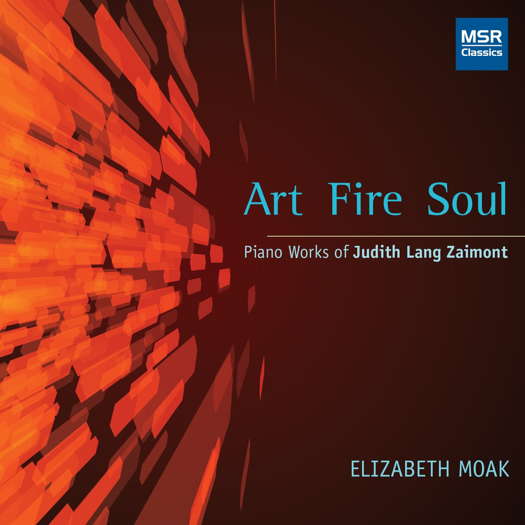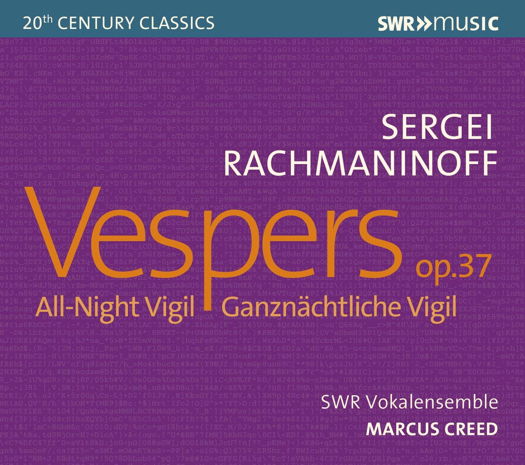 DISCUSSION: John Dante Prevedini leads a discussion about Music and the Visual World, including contributions from Celia Craig, Halida Dinova and Yekaterina Lebedeva.
DISCUSSION: John Dante Prevedini leads a discussion about Music and the Visual World, including contributions from Celia Craig, Halida Dinova and Yekaterina Lebedeva.
- Institute for Young Dramatic Voices
- Danacord Records
- Gunther Schuller
- Jerome Rose
- Emile Jacques-Dalcroze
- London Mozart Players
- Melton Mowbray
- Haruka Fujii
 SPONSORED: CD Spotlight. An Encyclopedic Recital - Elizabeth Moak plays Judith Lang Zaimont, heard by the late Howard Smith.
SPONSORED: CD Spotlight. An Encyclopedic Recital - Elizabeth Moak plays Judith Lang Zaimont, heard by the late Howard Smith.
All sponsored features >>

Hauntingly Beautiful
Rachmaninov's Vespers,
recommended by GERALD FENECH
'Although the choir is not Russian, performances are as passionately devotional as one can expect, particularly the soprano and bass sections, who capture the wide range of dynamics with astounding clarity and vision.'
Sergei Rachmaninov (1873-1943) is rightly considered as one of Russia's truly great twentieth century composers, but above all, as one among a select group of pianists who enjoy legendary status. Born into a musical family, he graduated from the Moscow conservatory in 1892 having already composed several piano and orchestral pieces. Following the fiasco of his first symphony in 1897, the composer entered a four-year depression that almost wrecked his career, but successful therapy and lots of patience and hard work allowed him to get the musical spark back. His second piano concerto of 1901 turned things round completely. Its success was immense, and to this day it is one of the most performed concertos in the repertoire.
For the next sixteen years Rachmaninov conducted at the Bolshoi Theatre among other venues, and toured the USA for the first time. Following the 1917 Revolution, the composer left his homeland for good, settling in New York till the end of his life in 1943. Between 1918 and 1943 he completed just six works, including the Symphony No 3, the Paganini Variations and the Symphonic Dances. One month before his death on 28 March 1943, Rachmaninov was granted American citizenship.
His catalogue only contains 45 opus numbers, but these are made up of a variety of genres including solo piano works, symphonies, concertos, opera, songs and sacred choral music. Among the latter we find his famous Vespers, Op 37 (All Night Vigil). Hauntingly beautiful, the Vespers is a cornerstone of the Russian choral repertoire, its fifteen 'a cappella' movements considered amongst the composer's finest achievements.
Listen — Rachmaninov: Rejoice O Virgin (Vespers)
(track 7, 0:01-0:40) © 2004 SWR Media Services GmbH,
2019 Naxos Deutchland Musik & Video Vertriebs GmbH :
Composed and premiered (10 March) in 1915 against a background of political upheaval in Russia and the early throes of World War I, the sense of spiritual transcendence in the work may be interpreted as Rachmaninov's response to the suffering and chaos around him. Although the composer was no traditional believer, the rituals and liturgy of the Orthodox Church were an essential part of his cultural background. Indeed, his use of chants from the Russian church formed the basis of the work's fifteen sections. The remaining five were altogether new, but they are so heavily influenced by tradition that it is well nigh impossible to tell the difference. The Vespers are indeed a testimony to Rachmaninov's amazing compositional skill through which he explores a variety of textures, timbres, rhythms and registers in a wholly original way.
Listen — Rachmaninov: Glory to God in the Highest (Vespers)
(track 13, 5:08-6:03) © 2004 SWR Media Services GmbH,
2019 Naxos Deutchland Musik & Video Vertriebs GmbH :
Although the choir is not Russian, performances are as passionately devotional as one can expect, particularly the soprano and bass sections, who capture the wide range of dynamics with astounding clarity and vision.
Listen — Rachmaninov: Gladsome Light (Vespers)
(track 5, 2:26-3:07) © 2004 SWR Media Services GmbH,
2019 Naxos Deutchland Musik & Video Vertriebs GmbH :
Recorded in June 2004, this reissue can still hold its own with more recent ventures and, despite some scant annotations, I am still in favour of a strong recommendation.
Copyright © 20 August 2019
Gerald Fenech,
Gzira, Malta

CD INFORMATION - SERGEI RACHMANINOV: VESPERS OP 37


